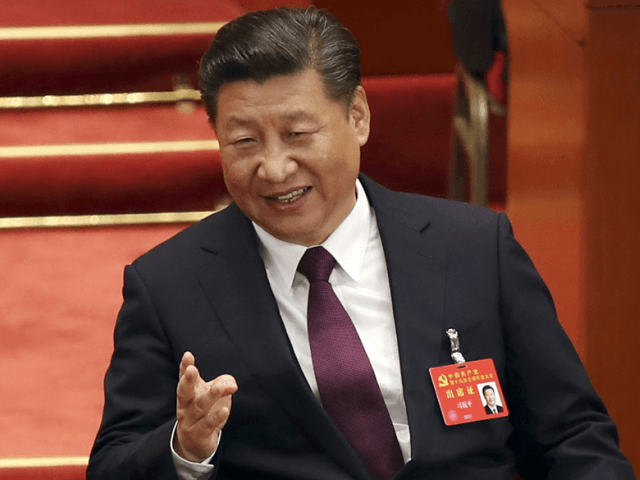President Xi Jinping’s quest to strip communism of its Western roots continued in Chinese state media this week, with the nation’s Global Times adamantly asserting in a column Sunday that China is unlike the Soviet Union because it boasts superior “ancient traditions” to other societies.
Xi introduced a new doctrine titled “Thought on Socialism with Chinese Characteristics for a New Era”—or, more commonly, “Xi Jinping Thought”—to the Communist Party of China (CPC) Congress in a three-hour speech last week. Communist Party officials are now working to codify “Xi Jinping Thought” in the party’s constitution, adding the leader’s name beside those of Mao Zedong and Deng Xiaoping.
On Sunday, Global Times author Zhang Jiadong insisted in a column that the CPC “differs remarkably from the Soviet Union system and the electoral system in the West” despite the fact that the architects of communism, Karl Marx and Friedrich Engels, were Europeans.
“In terms of political culture, Chinese civilization may not enjoy the longest history of all ancient civilizations, but it has survived vicissitudes for thousands of years and still prospers—the epitome of Chinese people’s vitality and creation—as well as a reflection of the political culture in Chinese civilization,” Zhang wrote. “China developed the advanced political system from the feudal age starting with the establishment of the Qin Dynasty (221-206 BC) and ending with the Qing Dynasty (1644-1911).”
Tying the CPC to the Qin Dynasty allows Zhang to argue that what makes the Communist Party powerful is not communism, but Chinese political supremacy. Zhang goes on to claim that the Chinese Communists’ efficiency is a product of “thousands of years of administrative traditions,” despite communism being present in Chinese government for less than a century.
“China’s political strength lies in four aspects: political stability, policy consistency, high administrative efficiency, and openness and inclusiveness,” Zhang argues. “Political stability concerns the stability of a political culture and system.”
In the People’s Daily, the official CPC newspaper, a column published Monday boasted of a “more confident and aspiring China” growing out of the implementation of communism. “China has lifted more than 700 million people out of poverty since the launch of reform and opening up some 40 years ago, and the goal of building a moderately prosperous society is well within reach,” the column claimed, without discussion of the millions of lives lost under Mao Zedong and his successors.
China Daily, another state propaganda outfit, appeared to grapple with the paradox of fervent nationalism and the imposition of a foreign ideology like communism more openly than the Global Times. “The question is how to take Marxism, a 19th-century economic theory that analyzed social relations during the industrial revolution, and make it relevant to China in the 21st century,” it noted on Sunday. The answer, it posted, was the Xi proposal that “a political system cannot be judged in abstraction without regard for its social and political context, its history and its cultural traditions.”
The “Chinese characteristics” part of Xi Jinping’s “Socialism with Chinese Characteristics” is so far the most unique reform Xi has presented to the CPC during its once-in-five-years Congress. During his three-hour speech, Xi presented himself as the torchbearer of the foreign ideology of communism and the protector of traditional Chinese culture. He urged China to take “center stage” in the world, which required an iron grip over pro-democracy areas like Taiwan, Hong Kong, and Tibet. He promised a “moderately prosperous society” by 2035—the end of China’s term, he vowed, as a developing nation. Xi also presented a plan to fully modernize the military and use it to expand into territories his regime already claims as its own in places like the South China Sea.
In addition to promoting Chinese cultural supremacy, Xi’s speech served to promote the cult of personality he has developed around himself. Chinese state media happily obliged in aiding this effort, with commentators claiming Xi’s speech was flawless and without error, and outlets reporting that his extensive, technocratic speech somehow went “viral” throughout Chinese social media.

COMMENTS
Please let us know if you're having issues with commenting.